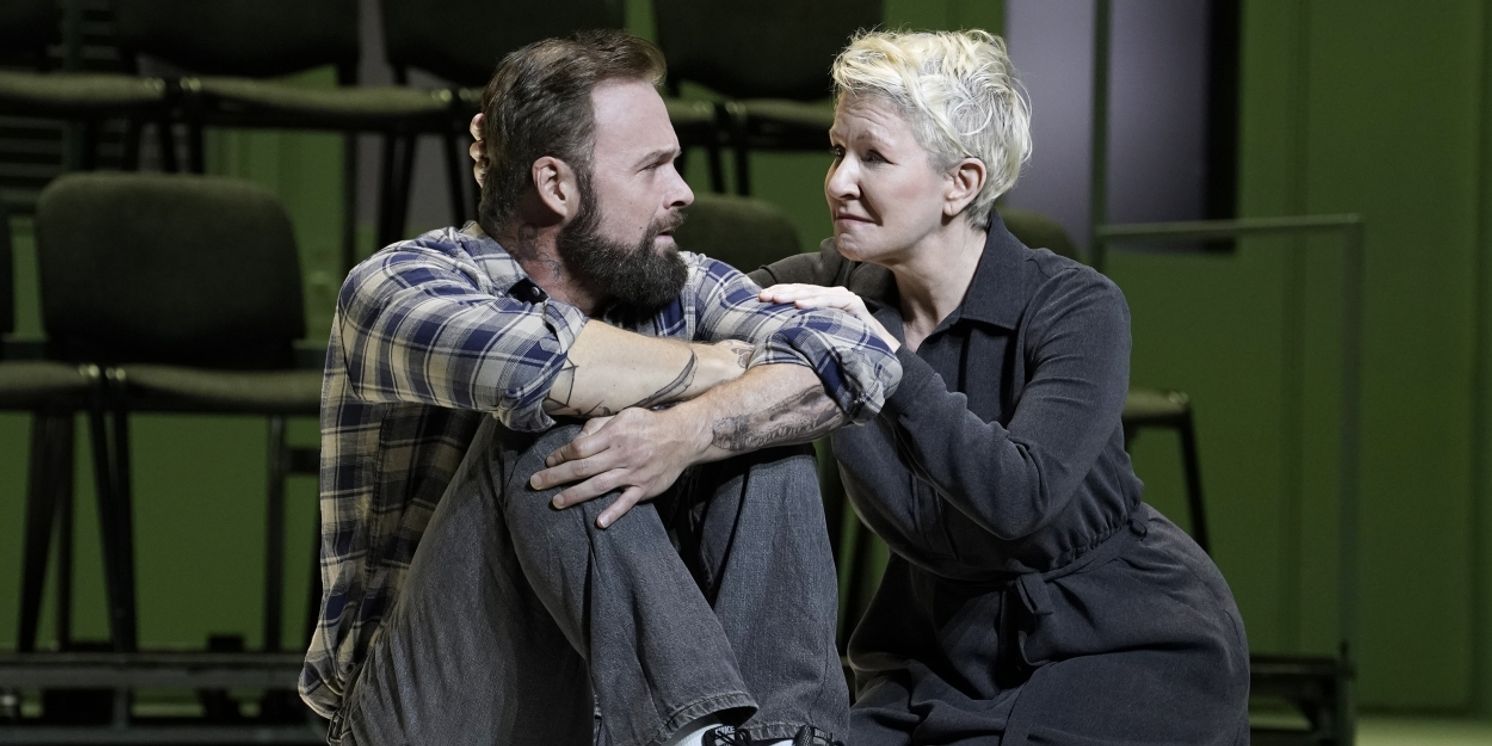Review: Met Audience Entranced by DiDonato and McKinny in Heggie-McNally DEAD MAN in House Debut
Superb Cast Under Ivo Van Hove’s Direction and Conducted by Music Director Yannick Nezet-Seguin

About a decade ago, when I interviewed mezzo Susan Graham about her then-upcoming role in the Met’s baroque pastiche, THE ENCHANTED ISLAND, she raved about the music of Jake Heggie, who was not very well-known outside of music circles at the time, and how thoughtfully and wonderfully he wrote for the voice. By that time DEAD MAN WALKING—the opera based on Sister Helen Prejean’s memoir about her ministry on death row, which had its Met premiere on September 26—had already had its world premiere in San Francisco. Portraying Sister Helen was Graham herself.
At the Met, Graham is now the mother of the death row inmate, Joseph De Rocher, and the Met’s current mezzo superstar, Joyce DiDonato is Sister Helen, with bass-baritone Ryan McKinny as De Rocher, the death row convict she counseled. They introduced many in the Met audience to Heggie, in a riveting performance with the Met orchestra under Yannick Nezet-Seguin, and the composer was greeted with open arms.
It’s rather surprising, really, for the audience to embrace a contemporary piece like this, no matter how easily it falls upon the ears, considering the subject matter. (It is, in fact, the most frequently performed contemporary opera.) In this Ivo van Hove production, it starts with a rape and double murder in a rather graphic film, video/film being one of van Hove’s trademarks. It ends with a death by lethal injection, also graphically shown in live video.
De Rocher is not exactly a sympathetic character—denying his guilt till almost the end of the opera's three-hour running time. And, Sister Helen has a troubled soul, no matter how deep her beliefs, no matter how determined she is to reach the convict and help set his soul free. Plus, there is the hot-button issue of capital punishment, which is on stage from start to finish.
Part of the work’s appeal, in this production at least, along with Heggie’s easy score (and, one shouldn’t forget, Terrence McNally’s finely wrought and written libretto, with humor where you couldn’t imagine it could be), are the performances and voices of DiDonato and McKinny. They are superb acting singers who reach out to the audience as they communicate with one another—and van Hove’s use of video, which elsewhere has often seemed gimmicky and trite, here helps to cement the relationships between the attractive singers and audience by bringing them close-up, in-your-face. It also made us part of the execution, making the capital punishment issue more personal.
The roles in this opera treat these two artists differently. For DiDonato, after her blazing appearance in the Puts-Pierce version of THE HOURS, it offers her a lower key presence on stage and music that is less dramatic in drawing the character, which she must do in part by herself. McKinny is a different story. While he’s been at the Met before, he has never had a role like this—one that audiences are unlikely to forget. He seemed a powerhouse, both vocally and on screen. The scene between the two singers, as she finally gets him to admit his guilt—which he has adamantly denied for more than three quarters of the opera—is devastating.
The cast was wonderful, to a person. Soprano Latonia Moore—who was remarkable in Terence Blanchard’s CHAMPION, as Emile Griffith’s mother—would have walked away with the opera if the stars were not so unbeatable. As Sister Rose, she was a fine foil for DiDonato, a little more worldly. For example, in Act II, when the troubled Sister Helen has problems sleeping and asks Rose to do a rosary with her, Rose says, “Do you know what time it is?” and excuses herself for her bed.
I wondered how mezzo Graham felt taking a secondary role, as a mother who loved her son, no matter what horrific act he may have done, after originating Sister Helen in the original production. But then I recalled what a gracious artist she was and I was happy to hear that she was still in good voice and tender manner. (Another bit of luxury casting was baritone Rod Gilfry, who sang the father of one of De Rocher’s victims.)
Praise must go out to tenor Chad Shelton, as Father Grenville, the prison chaplain and bass Raymond Aceto as Warden George Benton. And, of course, the Met chorus was in its usual fine form under Donald Palumbo.
At first, Jan Versweyveld’s set design seemed curiously monotone—until the video was projected on it and it suddenly made very good sense. This is probably the only piece of stage craft set in a prison where there is none of the usual trappings, like bars or handcuffs. The designer’s handling of the scene change to the execution was superb. (He did the lighting design as well.) An D’Huys’s costumes made no concessions to the kinds of things that Met audiences are used to but were as muted, and fitting, as the set design.
Even if you’ve read Sister Helen’s memoir or seen the film, the opera at the Met is something that you should see. Be there.
Photo: Karen Almond/Met Opera
DEAD MAN WALKING will be performed at the Met through the matinee at 1 pm on October 21. For more information about the opera and tickets, please see the Met’s website.
Reader Reviews
Videos

